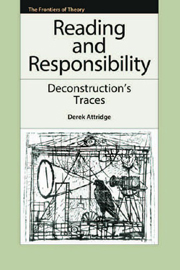Book contents
- Frontmatter
- Contents
- Acknowledgements
- Series Editor's Preface
- Introduction
- 1 Derrida, Deconstruction and Literary Criticism
- 2 Deconstruction Today: Literature, Postcolonialism and the Secret
- 3 Following Derrida
- 4 The Impossibility of Ethics: On Mount Moriah
- 5 Arche-jargon
- 6 Deconstruction and Fiction
- 7 Posthumous Infidelity: Derrida, Levinas and the Third
- 8 Roland Barthes's Obtuse, Sharp Meaning and the Responsibilities of Commentary
- 9 Nothing to Declare: J. Hillis Miller and Zero's Paradox
- 10 Radical Atheism and Unconditional Responsibility
- 11 The Place of Deconstruction: A Conversation with Jean-Michel Rabaté
- Bibliography
- Index
10 - Radical Atheism and Unconditional Responsibility
Published online by Cambridge University Press: 12 September 2012
- Frontmatter
- Contents
- Acknowledgements
- Series Editor's Preface
- Introduction
- 1 Derrida, Deconstruction and Literary Criticism
- 2 Deconstruction Today: Literature, Postcolonialism and the Secret
- 3 Following Derrida
- 4 The Impossibility of Ethics: On Mount Moriah
- 5 Arche-jargon
- 6 Deconstruction and Fiction
- 7 Posthumous Infidelity: Derrida, Levinas and the Third
- 8 Roland Barthes's Obtuse, Sharp Meaning and the Responsibilities of Commentary
- 9 Nothing to Declare: J. Hillis Miller and Zero's Paradox
- 10 Radical Atheism and Unconditional Responsibility
- 11 The Place of Deconstruction: A Conversation with Jean-Michel Rabaté
- Bibliography
- Index
Summary
At a Strathclyde University conference in 1986, Derrida brought a questioner up short with the comment, ‘I've never said nor thought that the metaphysics of presence was an “evil” … I'm inclined to think exactly the contrary, that it's good. There is no “good” outside the metaphysics of presence’ (‘Some Questions’, 257). Jonathan Culler, sensing the consternation among many members of the audience who had heard that deconstruction was an attack on ‘the metaphysics of presence’, asked Derrida to expand on his remark, and to explain what drives the impetus to deconstruct, which he did, in part, as follows:
I have to deal with Necessity itself. It is something or someone, some x, which compels me to admit that my desire, for good, for presence, my own metaphysics of presence, not only cannot be accomplished, meets its limit, but should not be accomplished because the accomplishment or the fulfilment of this desire for presence would be death itself; the good, the absolute good, would be identical with death … Necessity is the drive, or the counterdrive; it's a drive which bars the fundamental drive towards presence, pleasure, fullness, plenitude, etc. The dream beyond Necessity … is the plenitude which wouldn't be death. This combination of dream and necessity explains the indefatigable drive for deconstruction. (260–1)
This response probably didn't reduce the perplexity of many in the audience, but it did set out very clearly a nexus that remained central to Derrida's thinking throughout his career.
- Type
- Chapter
- Information
- Reading and ResponsibilityDeconstruction's Traces, pp. 138 - 148Publisher: Edinburgh University PressPrint publication year: 2010



